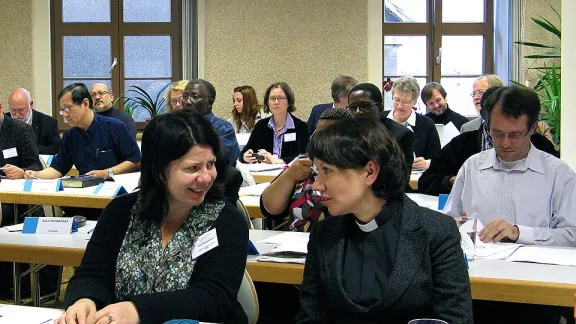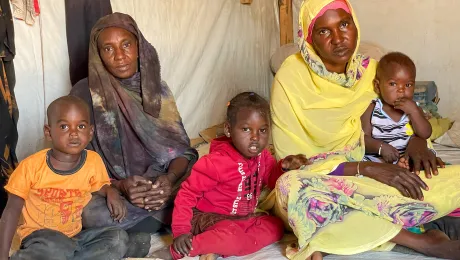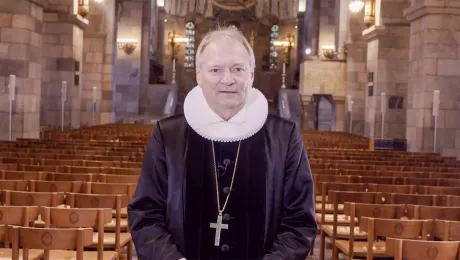
(left to right) Rev. Dr Elena Bondarenko (Russian Federation) and Rev. Anne Burghardt (Estonia) were among the participants at the Wittenberg consultation on Lutheran theological education. © LWF/Anli Serfontein
Theologians and Development Workers Underline Women’s Contribution
The critical need for gender justice in theological education and in defining development programs was one of the key themes discussed at two recent international meetings of The Lutheran World Federation (LWF) in Germany.
“Secure foundations of the past and aspirations for the future: Lutheran Theological Education for Communion Building towards 2017,” was the theme of the 18-22 October global consultation of Lutheran theologians and educators in Wittenberg, Germany.
In addition to the plenary and small group discussions, the women delegates at the Wittenberg gathering discussed further their experiences of being theologians in different parts of the world, and explored how they could strengthen networks of women theologians.
They said while it was encouraging to note that in some regions of the LWF, women comprise nearly 50 percent or more than half of those studying theology, in other regions it was still difficult for women to enrol for theological studies. Where women could pursue such studies, several challenges were identified including access to scholarships at masters’ or doctorate levels. The women delegates noted that overall theology is still a very male dominated field, with even fewer women teaching theology.
Dr Mariette Razivelo, a professor at the Lutheran Seminary of the Malagasy Lutheran Church in Madagascar, noted that about 40 percent of her students were women. She said the global LWF consultation would help such church institutions in developing their curricula.
Also discussed were the expectations of many theologically trained women, of which ordination was a key concern. The women noted that in some countries, theological training did not necessarily lead to possibilities for ordination.
Rev. Lilana Kasper explained the role of the Female Theologians Forum of the Lutheran Communion in Southern Africa (LUCSA): “We empower the female pastors who serve the local congregations so that they are able to do their work better, and handle issues better. We prepare them for leadership positions, so that when leadership positions in the churches come up, they are able to take up such positions.”
The women agreed that regional networks should be nurtured in order to support women for high-level leadership positions in the church and its institutions. Some regions are already working on this: Latin America and Caribbean is developing a women theologians’ group within the recently created women and gender justice network. In LUCSA, the Female Theologians Forum and women theologians from other LWF sub-regions will hold a consultation in December that will include focus on the contribution of female African Lutheran theologians towards the 500th Reformation anniversary in 2017.
At a joint LWF – Mission Eine Welt conference, 21-25 October, in Neuendettelsau, southern Germany, the issue of changing gender roles in Asia and Africa and the impact on development and on church life were discussed at length.
Rev. Dr Elaine Neuenfeldt, LWF secretary for Women in Church and Society, emphasized the importance of strengthening regional networks and initiatives that make visible women’s theological reflections and contributions in the Lutheran communion. She spoke of the possibility to have a global conference for women theologians in 2014.
(Written for LWI by Berlin-based journalist Anli Serfontein)
More from the Wittenberg consultation on theological education | More from the joint LWF-Mission Eine Welt conference


